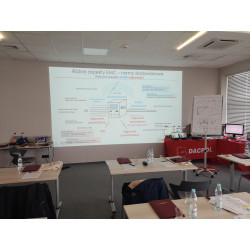trebuie să fii logat
-
întoarce-teX
-
Componente
-
-
Category
-
Semiconductori
- Diode
- Tiristoare
- Module izolate electric
- Punți redresoare
-
Tranzistori
- Tranzistoare | GeneSiC
- Module MOSFET SiC | Mitsubishi
- Module MOSFET SiC | STARPOWER
- Module ABB SiC MOSFET
- Module IGBT | MITSUBISHI
- Module tranzistor | MITSUBISHI
- Module MOSFET | MITSUBISHI
- Module tranzistor | ABB
- Module IGBT | POWEREX
- Module IGBT | INFINEON (EUPEC)
- Elemente semiconductoare - Carbură de siliciu (SiC)
- Accesați subcategoria
- Drivere
- Blocuri de alimentare
- Accesați subcategoria
- Traductoare electrice
-
Componente pasive (condensatori, rezistențe, siguranțe, filtre)
- Rezistori
-
Siguranţe
- Siguranţe de dimensiuni mici pentru sistemele electronice - seria ABC şi AGC
- Siguranțe tubulare cu acționare rapidă
- Siguranțe cu timp de întarziere pentru caracteristicile GL/GG și AM
- Siguranţe ultrarapide
- Siguranțe cu acționare rapidă la standarde din Marea Britanie și America
- Siguranțe cu acționare rapidă la standarde europene
- Siguranțe de tracțiune
- Siguranțe de înaltă tensiune
- Accesați subcategoria
-
Condensatori
- Condensatoare pentru motoare
- Condensatori electrolitici
- Condensatori snubbers
- Condensatori de putere
- Condensatoare pentru circuite de curent continuu DC
- Condensatoare de putere reactivă
- Condensatoare de înaltă tensiune
- Condensatoare pentru încălzirea prin inducţie
- Condensatoare de impuls
- Condensatoare DC LINK
- Condensatoare pentru circuite AC/DC
- Accesați subcategoria
- Filtre EMI
- Supercapacitori
-
Protecție la supratensiune
- Protecție la supratensiune pentru aplicații coaxiale
- Protecție la supratensiune pentru sistemele de supraveghere video
- Protecție la supratensiune pentru cablurile de alimentare
- Limitatoare pentru LED-uri
- Limitatoare de supraveghere pentru panourile solare
- Protecția sistemului de cântărire
- Protecție la supratensiune pentru Fieldbus
- Accesați subcategoria
- Accesați subcategoria
-
Relee şi contactoare
- Teoria releelor și a contactoarelor
- Relee semiconductoare AC 3-faze
- Relee semiconductoare DC
- Controlere, sisteme de control si accesorii
- Soft start si relee reversibile
- Relee electromecanice
- Contactoare
- Întrerupătoare rotative
-
Relee semiconductoare AC monofazate
- Relee semiconductoare cu o singură fază, seria 1 D2425 | D2450
- Relee în stare solidă monofazate, seria CWA și CWD
- Relee în stare solidă monofazate, seria CMRA I CMRD
- Relee semiconductoare monofazate, seria PS
- Relee semiconductoare duble și quad, AC seria D24 D, TD24 Q, H12D48 D
- Relee monofazate serie gn
- Relee cu stare monofazată din seria Ckr
- Relee de curent alternativ monofazate pentru SERIA ERDA ȘI ERAA
- Relee monofazate 150A AC
- Relee duble semiconductoare integrate cu o radiator din șină DIN
- Accesați subcategoria
- Relee semiconductoare monofazate pentru PCB de curent alternativ
- Relee de interfaţă
- Accesați subcategoria
- Componente inductive
- Radiatoare, varistoare, protectie termica
- Ventilatoare
- Aer condiţionat, accesorii carcase industriale, Instalatii de racire
-
Baterii, încărcătoare, surse de alimentare tampon și invertoare
- Acumulatoare, încărcătoare - descriere teoretică
- Baterii cu ioni de litiu. Baterii standard. Sistem de gestionare a bateriei (BMS)
- Acumulatoare
- Încărcătoare de baterii și accesorii
- Surse de alimentare UPS și tampon
- Convertoare și accesorii pentru panouri fotovoltaice
- Stocare a energiei
- Celule de combustibil
- Baterii cu ioni de litiu
- Accesați subcategoria
-
Automatizări
- Futaba Drone Parts
- Limita de switch-uri, switch-uri micro
- Traductoare de senzori
- Pirometre
- Contoare, Relee, Indicatoare de panou
- Dispozitive de protecție industriale
- Semnalizări luminoase şi acustice
- Camera de imagistică termică
- Afișaj LED
- Echipamente de control
-
Dispozitive de înregistrare
- Înregistrator temparatură cu bandă şi indicatoare digitale de înregistrare - AL3000
- Microprocesoare, înregistrator cu ecran LCD seria KR2000
- Înregistrator KR5000
- Contorul cu funcţia de înregistrare de umiditate şi temperatură HN-CH
- Materiale consumabile pentru Înregistratoare
- Compact înregistrator grafic 71VR1
- Înregistrator KR 3000
- Înregistrator PC seria R1M
- Înregistrator PC seria R2M
- Înregistrator PC, 12 intrări izolate - RZMS
- Înregistrator PC, USB, 12 intrări izolate - RZUS
- Accesați subcategoria
- Accesați subcategoria
-
Cabluri, fire Litz, furtunuri din material plastic, conexiuni flexibile
- Fire
- Fire Litz
-
Cabluri pentru aplicaţii extreme
- Cabluri de extensie şi compensare
- Cabluri de Thermocouple
- Cabluri de conectare pentru senzori PT
- Conductor multiplu cu fire de la temp. -60C la +1400C
- Cabluri de medie tensiune
- Fire de aprindere
- Cabluri de încalzire
- Conductor singur pt. cabluri cu temp. -60C la +450C
- Cabluri pentru calea ferată
- Cabluri de încălzire Ex
- Accesați subcategoria
- Tuburi de protecție
-
Cabluri împletite
- Cabluri plate - împletite
- Cabluri - panglica rotund
- Cabluri - panglică-plat foarte flexibil
- Cabluri panglică-rotund foarte flexibil
- Împletituri de cupru cilindrice
- Împletituri de cupru cilindrice cu protecţie
- Conexiuni flexibile de împământare
- Împletituri cilindrice din oțel galvanizat inoxidabil
- Împletituri de cupru izolate PCV - temperatura până la 85 C
- Împletituri plate din aluminiu
- Set de joncţiune - tuburi și împletituri
- Accesați subcategoria
- Echipamente de tracțiune
- Terminale pentru cablu
- Bare flexibile izolate pentru autobuz
- Bare flexibile multistrat de autobuz
- Sisteme de cablare (PESZLE)
- Furtunuri
- Accesați subcategoria
- Vezi toate categoriile
-
Semiconductori
-
-
- Furnizori
-
Aplicații
- Automatizare HVAC
- Automatizare industriala
- Automatizare industriala
- Componente pentru atmosfere potențial explozive (EX)
- Dispozitive industriale de protecție
- Echipamente pentru dulapuri de distribuție, control și telecomunicații
- Energy bank
- Încălzire prin inducție
- Mașini de sudat și mașini de sudat
- Mașini pentru termoformarea materialelor plastice
- Mașini pentru uscarea și prelucrarea lemnului
- Mașini-unelte CNC
- Măsurarea și reglarea temperaturii
- Măsurarea și reglarea temperaturii
- Minerit, metalurgie și fondare
- Motoare și transformatoare
- Surse de alimentare (UPS) și sisteme de redresare
- Tipărire
- Tracțiune de tramvai și cale ferată
- Unități de curent alternativ și continuu (invertoare)
-
Instalare
-
-
Inductori
-
-
Dispozitive de inducție
-
-
https://www.dacpol.eu/pl/naprawy-i-modernizacje
-
-
Serviciu
-
- Kontakt
- Zobacz wszystkie kategorie
Basics of Electromagnetic Compatibility: What It Is and Why It's Important? 1 of 8

Basics of Electromagnetic Compatibility: What It Is and Why It's Important? 1 of 8
Definition of Electromagnetic Compatibility (EMC)
Electromagnetic Compatibility (EMC) is a field of science and engineering that deals with preventing electromagnetic interference and ensuring that electronic devices and systems can operate alongside each other without mutual electromagnetic interference. In short, EMC concerns the ability of devices to function in environments with various sources of electromagnetic disturbances and minimize their impact on other devices.
In today's world, where electronics and communication systems are widely used in various fields such as industry, transportation, medicine, and telecommunications, issues related to EMC are of immense importance. Without proper electromagnetic compatibility, there is a risk of disturbances that can lead to system failures, data loss, and even pose a threat to user safety.
Within the field of Electromagnetic Compatibility, there are standards and regulations that define the minimum requirements for electromagnetic emissions and immunities. Organizations such as the International Electrotechnical Commission (IEC) and the Federal Communications Commission (FCC) develop standards that must be followed to meet EMC requirements. Compliance with these standards allows for effective cooperation between different electronic devices and minimizes the risk of electromagnetic interference.
It is important for manufacturers, designers, and engineers to have an awareness and understanding of Electromagnetic Compatibility and to implement appropriate techniques for designing, testing, and securing devices to ensure their reliability, durability, and compliance with regulations. Through proper EMC practices, the risk of electromagnetic interference can be minimized, thereby ensuring stable and safe operation of electronics in various environments.
Basic Principles of Electromagnetic Compatibility (EMC):
Electromagnetic Compatibility (EMC) is based on several key principles aimed at minimizing electromagnetic interference and ensuring the uninterrupted operation of electronic devices and systems. Here are the basic principles of EMC:

Principle of Emission
This principle concerns controlling the electromagnetic interference emissions generated by devices. Electronic devices can produce various types of electromagnetic signals that can interfere with the operation of other devices. The task of EMC is to limit these emissions by employing appropriate design techniques, shielding, filtering, and other measures to minimize the generation of electromagnetic disturbances.

Principle of Immunity
This principle pertains to the resistance of devices to electromagnetic disturbances originating from other sources. Electronic devices should be resilient to electromagnetic disturbances that may occur in the environment, such as radio signals, electromagnetic fields, or electrical surges. Through proper design, shielding, attenuation, and other techniques, devices can be more resistant to disturbances and maintain their operational integrity.

Principle of Separation
This principle concerns ensuring adequate separation between devices to avoid mutual electromagnetic interference. Devices should be designed and placed in such a way as to minimize interaction between them. Examples of actions consistent with this principle include proper cable and wire arrangement, use of screens and shields, and appropriate spatial planning of electronic systems.
Principle of Control
This principle involves monitoring and controlling the quality of signals and voltages in electronic devices. By monitoring and regulating electrical signals and eliminating unwanted interference, the quality and stability of device operation can be effectively controlled.
Understanding and applying these basic principles of EMC is crucial for designers, engineers, and manufacturers of electronic devices. By adhering to these principles, the risk of electromagnetic interference can be minimized, ensuring reliability, durability, and compliance with regulatory requirements for electronic devices.
The Essence and Significance of Electromagnetic Compatibility (EMC) in Today's Technological Environments:
In today's digital world, where electronic devices and communication systems are an integral part of our lives, the essence of Electromagnetic Compatibility (EMC) is becoming increasingly important. EMC is crucial for ensuring the uninterrupted operation of devices and systems in the presence of diverse sources of electromagnetic disturbances.
The main objective of EMC is to minimize electromagnetic interference, which can cause failures, malfunctions, data loss, or even risk to user safety. The introduction of electromagnetic disturbances can lead to communication interference, instability in device operation, transmission errors, and contribute to performance limitations and improper functioning of electronic control systems.
It is important to understand that in today's technological environments, there are many different sources of electromagnetic disturbances. This may include radio transmissions, telecommunication systems, power grids, electric motors, medical devices, and even everyday consumer electronics. The impact of these disturbances on the operation of other devices can be significant and lead to serious consequences.
Therefore, the significance of EMC cannot be underestimated. Compliance with EMC principles and standards is not only a legal requirement in certain industries but also a necessary condition for ensuring the reliability, durability, and safety of electronic devices. EMC practices allow for the identification, control, and minimization of both electromagnetic emission and immunity disturbances, as well as the appropriate design, testing, and protection of electronic systems.
In the present times, when technology and electronics are integral parts of our professional and personal lives, proper EMC management is incredibly important. It contributes to ensuring the reliability of our devices, minimizing the risk of failures, protecting the health and safety of users, and facilitating stable and efficient operation in diverse environments.
Related product
Related posts
 Now available – DC/DC converters from PREMIUM
Now available – DC/DC converters from PREMIUM
 New release in DACPOL lighting for lathes – Kira covers
New release in DACPOL lighting for lathes – Kira covers





Leave a comment